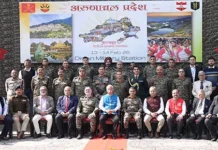Monday Musing
[ Ranjit Sinha ]
People of our country are familiar with hate speech, particularly during election period. People do not recall such hate speeches after the election process ends. In recent times, hate speeches have been becoming a day-to-day affair for some influential people, mostly political leaders or supporters of political parties. Last year, The Wire’s Heartland Hatewatch had reported at least 89 instances of alleged hate crimes and hate speeches in six northern states in a span of four months since October 2021.
Experts say that “there is no legal definition of hate speech in India. But there are good numbers of provisions in the laws which prohibit certain form of speech as exceptions to free speech.”
In our country, laws are in abundance for prevention of hate incidents and maintenance of peace and tranquillity. But most of these laws are of no use for a particular section of people, who are blessed with the hands of political big bosses, or who are maintaining healthy relationship with the political party in power.
In the northeastern region of the country, there are very few incidents of hate crimes and hate speeches. Very few incidents of hate speeches in the Northeast are not because of the existing strong laws, but because of strong social fabric and communal harmony that bind the different communities together with the bond of brotherhood.
Unless people, irrespective of political affiliations, caste, creed and religion, maintain certain social norms, the hate speeches will continue.
There is a good omen that the top court of our country extended the scope of its 2022 order beyond three states.
The Supreme Court had directed Uttar Pradesh, Delhi and Uttarakhand in October last year to promptly register criminal cases against those who were making hate speeches, without waiting for a complaint to be filed.
Now the SC has directed all states and union territories (UT) to register cases against those making hate speeches, even without any complaint.
Any hesitation to act according to the directive of the top court will be viewed as “contempt of the top court and appropriate action will be taken against the erring officers,” the SC pronounced.
The SC has ordered the director generals of police of all the states and UTs to issue direction(s) to their subordinates, “so that appropriate action in law will be taken at the earliest.”
The police department is also an agency of the government formed by a political party or parties. Therefore, questions arise. Will the police department perform its duty and take suo moto action against any offenders of hate speech in accordance with the law, without any influence of the ruling political party of any state? Will the police department of any state take action as a competent authority, without lending ears to ruling party higher-ups, if any minister or MLA is found to be involved in spreading hate speech?
Only time will give the answer.




